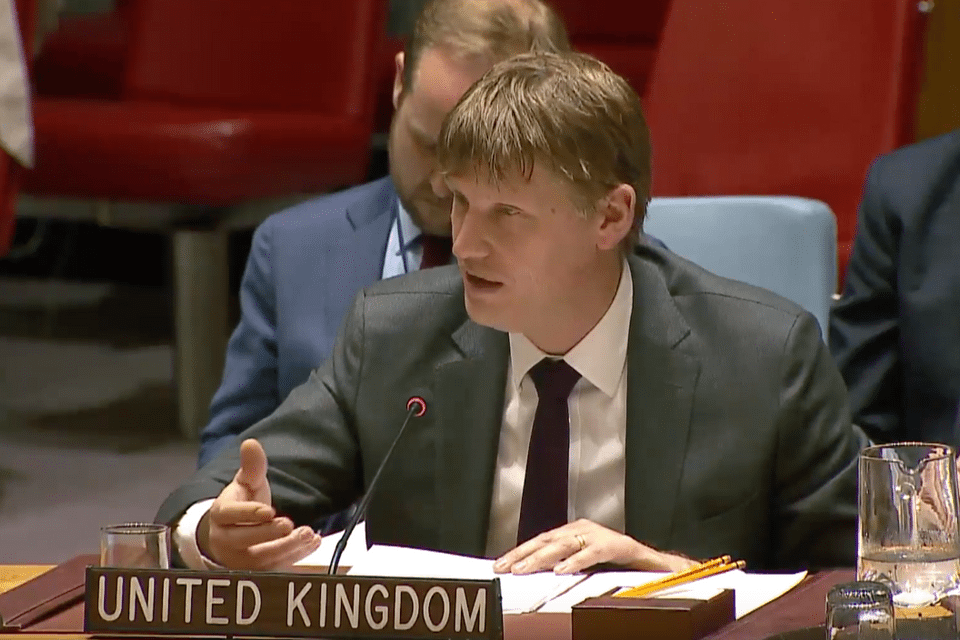Liberia: Important lessons for today's peacekeeping agenda
Statement by Ambassador Jonathan Allen, Deputy Permanent Representative, at the Security Council Meeting on UNMIL.

Thank you Mr President. Let me also thank our briefers. Let me start with my Swedish colleague and perhaps through her, to all who have done so much on the Peacebuilding Commission in Liberia. I’d like to also thank Assistant-Secretary General Zuev for his impressive and multi-lingual briefing and also to Child Liberty for what I thought was an inspiring and uplifting story. I think your comments show just how important it is that this Council remains very focussed on the impact of conflict on children and on women and I think you really brought that home to us in an inspiring and uplifting way so thank you for that.
Mr President, in 2003, when UNMIL was launched, the then Secretary-General made his first report to the Council based on an assessment mission and he said in his report then:
“Liberia remains highly unstable … as armed groups, militia and criminal elements operate throughout the country … Police officers lack training and have not been paid since early 2002 … Nearly 1 million Liberians, or a third of the population, are displaced. It is estimated that Liberia has some 27,000 to 38,000 combatants, many of whom are children.”
It is clear to us all that the Liberia of today is not the Liberia of 2003 and we in this Council should be united in congratulating Liberia’s leaders and people and in thanking UNMIL for this remarkable achievement.
UNMIL has been able to keep and build the peace since 2003 which a considerable feat given history of exclusion, political instability and cycles of violence and so we pay tribute to all SRSG Zarif, to all UN peacekeepers and staff who have worked in Liberia for their work and their duty. We particularly remember the 202 United Nations Peacekeepers who sadly gave their lives in service to the people of Liberia and in the service of all of us here who send those peacekeepers on those missions.
Mr President, I want to use this moment to reflect on some of the lessons learned for UNMIL, particularly what has gone well but also what could have been done differently. These are important lessons, not only for other peacekeeping missions but also how we sustain peace more generally; a concept that we are all debating in different formats at the moment.
So what has UNMIL done particularly well?
Well, UNMIL encouraged inclusive national ownership and it supported local capacity, which are two key conditions for the sustaining peace. Liberia’s police force –the change wrought in that force from the description by the then Secretary-General in 2003 to what we have now is perhaps an excellent example of this.
UNMIL also coordinated extremely effectively with international and regional actors, especially ECOWAS which remains a shining light in this Council’s engagement and UNMIL’s good offices were very effective at preventive diplomacy. For example, this helped to ensure a difficult election process remained peaceful, in accordance with the constitution and rule of law.
UNMIL demonstrated the strengths of the comprehensive approach to sustaining peace. The joint peacebuilding plan between the Mission, UN Country Team and government set clear and shared priorities to guide the transition. Under Sweden’s leadership, the Peacebuilding Commission has played an invaluable role.
However, we also need to be honest about the shortcomings of the Mission, and learn from those as well.
Arguably, the Mission stayed too long and created an over-dependence on the United Nations. A reluctance to discuss exit meant that transition planning started too late, resulting in funding gaps and UN development actors not stepping up sooner. The mission implementation plan should have included benchmarks and timescales to better focus staffing, resources and effort – and allow the Council to better track progress.
And we perhaps in the Security Council - and I know this is a feature of some of what the Secretary-General has said to us over the last couple of months - perhaps could also have ensured there are more realistic mandates with greater clarity on what a sustainable ‘end state’ was about.
Mr President looking forward, there is a clear role for the UN, through an enhanced Resident Coordinator’s Office, to support the new Government to consolidate stability and promote inclusive development. With its commitment to peaceful, just and inclusive societies, the framework of the SDGs provides a strong basis for this.
The UN will also have a unique role in supporting coordination amongst the international donors in a way which supports the government of Liberia’s priorities.
The UN must be careful that whilst it absolutely must provide that support, must also not to assume the new government’s responsibilities. We would urge the new government to see through the commitments made in the peacebuilding plan.
In 2003, the then-Secretary-General concluded in his report that “The road to lasting peace and security in Liberia is still fraught with multiple and formidable challenges”.
Liberia has certainly faced its fair share of challenges in the past 15 years – but we today should celebrate that with the support of the United Nations, Liberia’s people have overcome them.
And perhaps a reflection for us all around this table: Liberia was once an intractable conflict. It once hosted the United Nations’ largest peacekeeping mission. It once saw terrible violence against women and children, including child soldiers. A quarter of a million people died in the second civil war and there were very familiar issues of IDPs, refugees and food insecurity. We can look across some of the issues on our agenda today and there are similarities in that agenda very sadly. But perhaps the ultimate lesson is that with hard work, sustained engagement and determination from us all, we can see more Liberias out of today’s agenda.
Thank you Mr President.